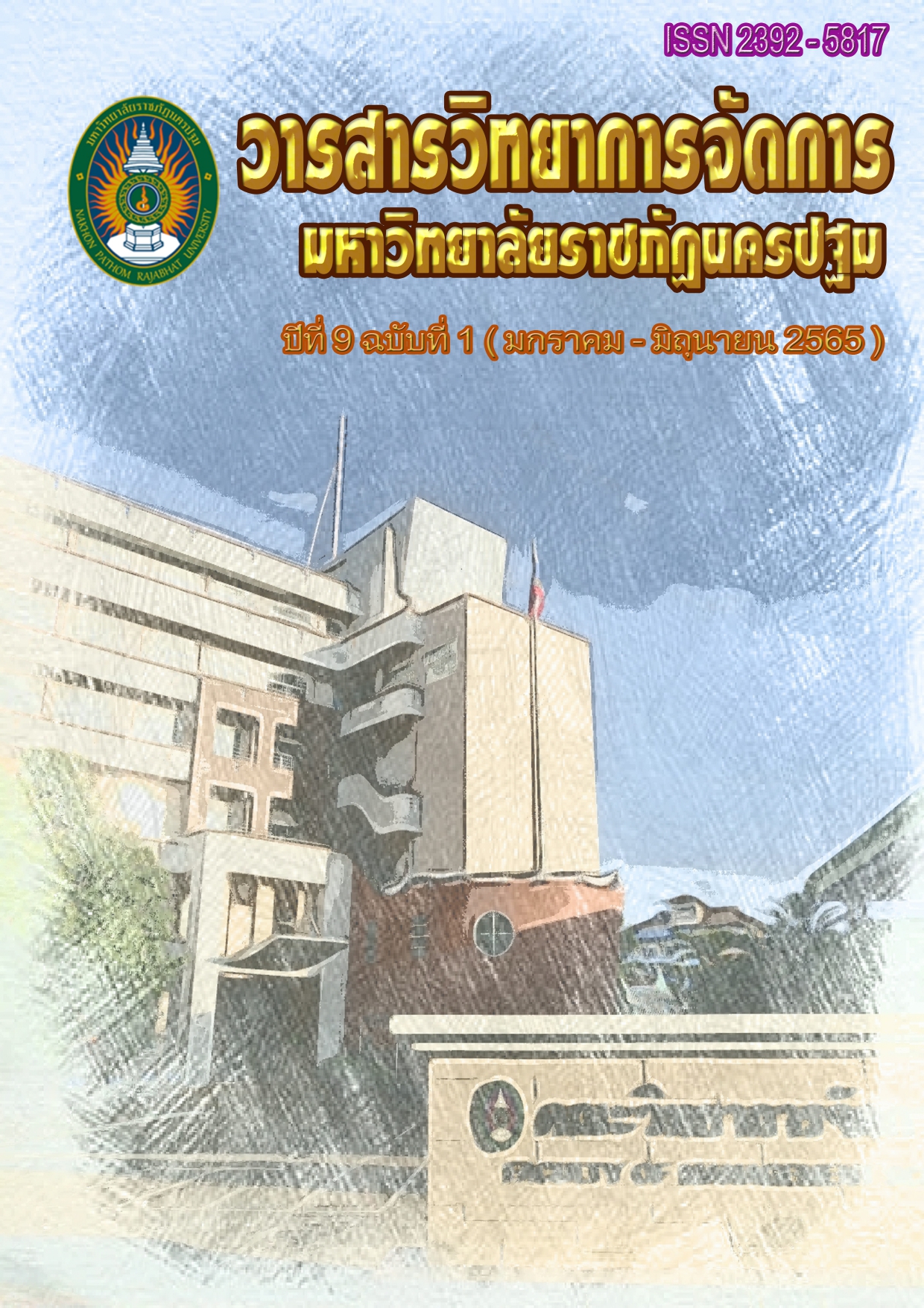Influence of Employee Engagement as the Mediator Between Human Resource Management and Employee Satisfaction Affecting the Employee Retention of A Company in The Plastic Packaging Industry Rayong Province.
Main Article Content
Abstract
This objective of this research is to 1) study the level of human resource management, employee engagement, employee satisfaction and employee retention of a company in the plastic packaging industry, Rayong Province, 2) study the employee engagement as the mediator between the human resource management and the employee retention of a company in the plastic packaging industry, Rayong Province, and 3) study the employee engagement as the mediator between the employee satisfaction and the employee retention of a company in the plastic packaging industry, Rayong Province. The samples used in this research were 100 employees of a company in the plastic packaging industry, Rayong Province, by Purposive Sampling. The statistics used in this research consist of frequency, percentage, mean and standard deviation values. The structural equation model (SEM) was analyzed by using the Smart PLS 3.0 program.
As results, it was found that the (1) employees of a company in the plastic packaging industry, Rayong province, have the overall level of human resource management, employee satisfaction, employee engagement and employee retention at a high level with the mean values of 3.00, 3.81, 3.81 and 3.25, and the standard deviations of 0.751, 0.813, 0.813 and 0.812, respectively, (2) for the factors directly influencing employee retention (ER), it was found that human resource management (HRM), employee satisfaction (ES) and employee engagement (EE) were 0.052, 0.635 and 0.279, respectively. The human resource management (HRM) and employee satisfaction (ES) indirectly influenced employee retention (ER) with the values of 0.056 and 0.153, respectively, and (3) for the overall factors affecting employee engagement (EE), it was found that the human resource management (HRM) and employee satisfaction (ES) were 0.200 and 0.547, respectively. Results of this research show that the human resource management resulting in employee engagement. In the same way, the job satisfaction also affects the engagement. The employee engagement is a key variable which directly benefits the retention of employees.
Article history : Received 30 July 2021
Revised 1 October 2021
Accepted 4 October 2021
SIMILARITY INDEX = 2.66 %
Article Details

This work is licensed under a Creative Commons Attribution-NonCommercial-NoDerivatives 4.0 International License.
The views and opinions of the article appearing in this journal are those of the author. It is not considered a view and responsibility of the editorial staff.
References
จันทนี ฮั่นเจริญ. (2561). การธำรงรักษาพนักงานของธุรกิจโรงแรมในอำเภอเกาะสมุย จังหวัดสุราษฎร์ธานี. การค้นคว้าอิสระ บริหารธุรกิจมหาบัณฑิต, มหาวิทยาลัยราชภัฏสุราษฎร์ธานี.
ชัญภร เสริมศรี. (2558). ความสัมพันธ์ระหว่างการบริหารทรัพยากรมนุษย์กับความผูกพันต่อองค์การของบุคลากร บริษัทแห่งหนึ่ง ในเขตนิคมอุตสาหกรรมอมตะนคร จังหวัดชลบุรี. งานนิพนธ์ รัฐประศาสนศาสตรมหาบัณฑิต (สาขาวิชาการบริหารทั่วไป), วิทยาลัยการบริหารรัฐกิจ มหาวิทยาลัยบูรพา.
ชูชัย สมิทธิไกร. (2557). พฤติกรรมผู้บริโภค. กรุงเทพมหานคร: บริษัท วี พริ้นท์ (1991) จำกัด.
เชิดพันธ์ พันธ์สุข. (2560). ความพึงพอใจในงานและความผูกพันต่อองค์การของพนักงานรักษาความปลอดภัยของโรงแรมในกรุงเทพมหานคร. การค้นคว้าอิสระ ศิลปศาสตรมหาบัณฑิต สาขาวิชาการจัดการอุตสาหกรรมการบริการและการท่องเที่ยว, มหาวิทยาลัยกรุงเทพ.
ตวงพร รุ่งเรืองศรี. (2563). ความพึงพอใจและความผูกพันต่อสถาบันของนิสิตวิทยาลัยการบริหารัฐกิจ มหาวิทยาลัยบูรพา. วารสารด้านการบริหารรัฐกิจและการเมือง, 9(2), 125-147.
ธีรวัฒน์ ศรีอนุชาต. (2556). ความสัมพันธ์ระหว่างปัจจัยด้านความพึงพอใจของพนักงานกับปัจจัยด้านความจงรักภักดีต่อองค์กรรัฐวิสาหกิจกรณีศึกษา ธนาคารออมสิน สานักงานใหญ่สายงานบริหารหนี้และกฎหมาย. ค้นคว้าอิสระ บริหารธุรกิจมหาบัณฑิต .สาขาวิชาการจัดการ, มหาวิทยาลัยหอการค้าไทย.
ปิยาพร ห้องแซง. (2555). การบริหารทรัพยากรมนุษย์ที่มีผลต่อความผูกพันในองค์กรของพนักงานสาขาธนาคารออมสิน ในเขตกรุงเทพมหานคร. ปริญญานิพนธ์ บริหารธุรกิจมหาบัณฑิต, มหาวิทยาลัยศรีนครินทรวิโรฒ.
เพ็ญนภา จันทร์บำรุง. (2559). ปัจจัยการบริหารทรัพยากรมนุษย์ที่มีอิทธิพลต่อความสำเร็จของกิจกรรมไคเซ็น กรณีศึกษาโรงงานอุตสาหกรรมผลิตชิ้นส่วนและประกอบรถยนต์ของญี่ปุ่นแห่งหนึ่ง. การค้นคว้าอิสระ บริหารธุรกิจมหาบัณฑิต .สาขาพาณิชยศาสตร์และการบัญชี, มหาวิทยาลัยธรรมศาสตร์.
มนตรี พิริยะกุล. (2553). ตัวแบบเส้นทางกำลังสองน้อยที่สุดบางส่วน. กรุงเทพฯ: มหาวิทยาลัยรามคำแหง.
สิริวรร พวงสว่าง. (2556). ความสัมพันธ์ระหว่างความพึงพอใจของพนักงานกับความผูกพันที่มีต่อองค์กร กรณีศึกษากลุ่มบริษัท พีรพัฒน์ เทคโนโลยี จำกัด (มหาชน). ค้นคว้าอิสระ บริหารธุรกิจมหาบัณฑิต. สาขา การจัดการ. มหาวิทยาลัยหอการค้าไทย.
สำนักงานเศรษฐกิจอุตสาหกรรม (สศอ) กระทรวงอุตสาหกรรม. (2563). ภาพรวมเศรษฐกิจและการฟื้นตัวของปี 2563 ภายใต้สภาวะโควิด-19. [ออนไลน์] สืบค้นเมื่อ 15 มิถุนายน 2564, จาก https://www.oie.go.th.
Aladwan, S. A. T. (2017). The impact of TQM and service employee satisfaction on government service quality: an empirical study in the Jordanian public sector. Ph.D. Thesis. The University of Birmingham.
Eseleni, M. M. (2017). Developing a framework to improve employee engagement leveraging by organisational culture in banks for developing countries: a case study from Libya. Ph.D. Thesis. School of Aerospace Transport and Manufacturing.
Hair Jr, J. F., Sarstedt, M., Ringle, C. M., & Gudergan, S. P. (2017). Advanced issues in partial least squares structural equation modeling. saGe publications.
Kulsoom, A. U. (2020). Employees’ Engagement and Job Commitment in the Ministry of Youth and Sports, Maldives. The University of Liverpool (United Kingdom).
Mohamed, S. A., & Ali, M. (2016). The importance of supervisor support for employees’ affective commitment: An analysis of job satisfaction. International Journal of Scientific and Research Publications, 6(2), 435-439.
Shi, J. (2018). The Development of Strategic Human Resource Management in the Chinese Financial Services Sector: Understanding the Roles of External Economic Factors and the State. Ph.D. Thesis. The University of Leeds Leeds University Business School Work and Employment Relations Division.
Xaba, T. N. (2015). The effects of corporate rebranding on employee engagement:
evidence from the professional services industry of South Africa. Master’s degree of Management in Strategic Marketing. The Faculty of Commerce, Law and Management, Wits Business School, University of the Witwatersrand, Johannesburg, South Africa.


